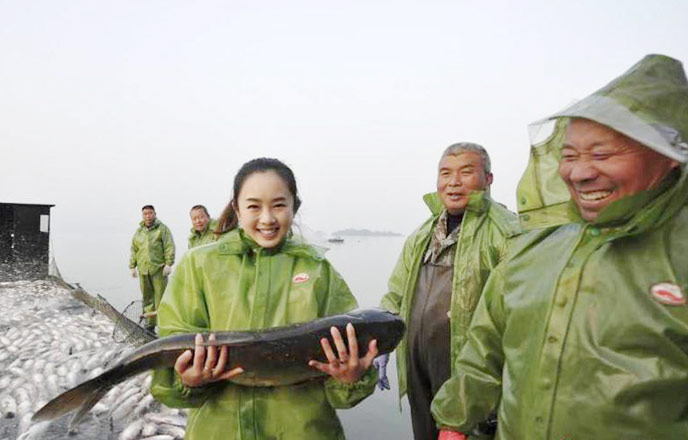New CPC leadership marks 100 days in power
CHANGES
Apart from concrete measures, there have also been obvious changes in the past 100 days.
The central authority announced eight bureaucracy-busting measures on Dec 4.
Political Bureau members were asked to conduct themselves in an exemplary way in improving the Party's work style, because they should "implement the dos before asking others to do so, and certainly not do something themselves if they don't want others to do it."
There were no traffic controls or red-carpet arrangements during Xi's visit to Guangdong, for example.
Moreover, other members of the Standing Committee of the Political Bureau of the CPC Central Committee including Li Keqiang, Liu Yunshan and Wang Qishan asked officials to be brief and not to read their prepared reports at meetings to save time for more concrete content.
Xi also led a campaign against pomp. Curbing "waste at the tip of the tongue" has become a catchphrase in China amid an intensified fight against food waste. And the "empty plate" drive is gradually evolving into a trend among both officials and the general public.
Responding to central authorities' call, this year's Spring Festival, or Chinese Lunar New Year which fell on Feb 10, became one of the most frugal such events ever, with not as many lavish feasts.
Xie Chuntao, professor at the Party School of the CPC Central Committee, noted the new leadership had introduced impressing new remarks, policies and strategic deployment in its first 100 days.
"The core of these new moves is they've been emancipating the mind, seeking truth from facts. With the things they've done and their easy-going, practical and self-disciplinary style, the new leaders have set themselves as role models in pushing forward reform, shunning empty talk and being doers," according to Xie.
To follow suit, local government departments and various industries also introduced measures to curb chronic problems, which won acclaim from the public and media.
Receiving and seeing off visitors used to be a big headache for Gao Peng, deputy project director of the China Three Gorges Corporation.
"The central authority's eight bureaucracy-busting measures have alleviated my burden," he said. "I really hope the new style can last."
Moreover, amid intensified anti-corruption efforts, two ministry-level officials -- Li Chuncheng, deputy secretary of the Sichuan Provincial Committee of the CPC, and Yi Junqing, director of the Central Compilation and Translation Bureau of the CPC Central Committee -- have been removed from their posts since the new leadership took office.
Spurred on by new leaders' resolve to fight corruption, China's microblog users have used the Internet to out corrupt local cadres.
The recent fall of some officials in the country was caused by online muck-rakers who used China's popular social networking websites to reveal their victims' scandalous behavior, such as starring roles in sex videos.
News reporting has also been refreshed, as Chinese state media have looked to improve their style in pursuit of "short, solid and fresh" news stories, in an attempt to respond to central authority calls to reject bureaucracy and formalism.
The trend has been highlighted by some slight changes in state media's recent reports of top leaders' activities.
The official Xinhua News Agency issued feature stories in December 2012 detailing the top leaders' personal and family situation. Overseas media labelled the move a big stride toward "political transparency."
Media institutions began to initiate live broadcasting of top leaders's inspection tours via their official microblogs. And ordinary people's stories appeared during the prime time evening news slots of China Central Television and on newspaper front pages.
The new leaders also won over many fans online who kept close tabs on each move of their "idols."
Microbloggers have begun to refer to Xi as "Xi Dada," a term that translates as "Uncle Xi" in some parts of China. "Pingping," a dual-syllable nickname often used by intimate friends or relatives, is also used as a moniker for the top leader.
Entries on the "Xuexifensituan" ("Learning from Xi Fan Club") account are often written in a tabloid style, with brief, declarative statements tracing the movements of the general secretary.
Qin Gang, professor at the Party School of the CPC Central Committee, said the new CPC leadership have made "a solid start" in the first 100 days. They have laid out comprehensive plans for realizing the "Chinese dream."
- China to keep sound growth under new CPC leadership
- China's fast development is due to CPC leadership
- China under CPC leadership to enjoy more prestige
- China makes remarkable progress under CPC leadership
- Political reform must under CPC leadership
- Xi attributes Tibet's development to CPC leadership
- Panchen Lama calls for support for CPC leadership
- Wuhan pilots cardless ATMs with facial recognition technology
- 700m people lifted out of poverty in over 30 years: white paper
- China provides world with $58 billion in development aid in six decades: white paper
- White paper says China on forefront in int'l peacekeeping
- China establishes system to ensure people's right to development: white paper
























